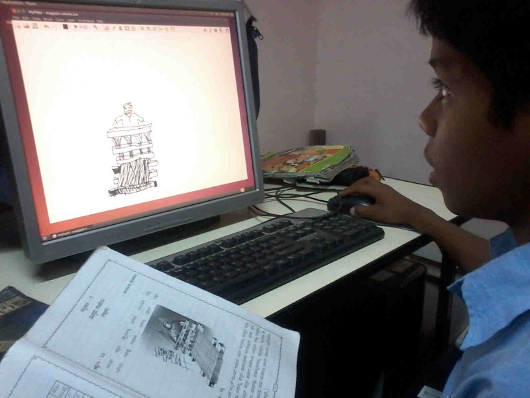It is widely accepted that digital technologies (popularly known as Information and Communication Technologies or ICT) have the potential to strengthen and reform school education. However, in the absence of a clear framework for program design, the impact of numerous governmental and non-governmental actors on learning processes and outcomes has not lived up to this potential.
The research projects undertaken by the The Centre for Education and Technology, IT for Change focus on cutting edge issues of ICT integration in education – collaborative OER models, professional learning communities of teachers and free and open technologies. We combine our research and programmatic work to make policy/programmatic framework recommendations to governments. The Centre also evaluates government and non-government ICT programs in education.
Project Outputs
Developing a Framework for ICT Integration in School Education in India
ITfC collaborated with Tata Trusts on a study to design a framework for integrating ICT into school education across India. The study built a knowledge base on ICT program design which was submitted to MHRD as a report. It provided a holistic framework, covering the five components of ICT in education – ICT infrastructure, school level implementation, teacher professional development (TPD), curricular resource development, and educational administration – to support the creation of an ecosystem for ICT integration. The study also aimed to influence organizations working in the area of ICT integration in education. Based on the recommended design, the report computed cost/investment benchmarks for a program integrating ICT in school education in India.
Exploring Teacher Development Through the TPACK Framework
Through a case study of an ICT program implementation in Telangana, this paper seeks to examine if the Technological Pedagogical Content Knowledge Framework (TPACK) can be useful for evaluating an ICT program. Based on interactions with teachers, educational administrators, and educational content developers, the paper explores teachers’ expectations of technology, their self-evaluation of their abilities to integrate technology for making digital resources, and the connection between their pedagogic practices and understanding of technology.
IT for Change at Comparative Education Society of India (CESI) Conference 2015
Gurumurthy Kasinathan presented a paper titled 'Domination and Emancipation: A Framework for Assessing ICT and Education Programs' at the CESI Conference, on 14th December, 2015. The theme of the conference was 'Education: Domination, Emancipation and Dignity'. The paper aims to provide a framework which bureaucrats and policy makers can use to assess the design of ICT programs in education.
Note for CABE Meeting March 18, 2011 - Why ICTs in Education Programs Fail or Succeed and What Are Their Implications for Policy?
Based on our advocacy work about the National Policy on ICT in School Education, the issue of 'vendor-driven ICT programs' was discussed in the Central Advisory Board of Education (CABE) and a sub-committee was set-up to study the issue. ITfC was asked to make a presentation at the meeting of the sub-committee on ICTs in School Education of the Indian Central Advisory Board of Education (CABE). The presentation discussed the need to move from technological perspective/vendor driven first generation programs to second generation programs. It also provided specific inputs on the policy and programmatic aspects of the issue.
ICT Programs in School Education: PPP Models vs. Integrated Approach
This case study of the Public Private Partnership (PPP) models vs. the integrated approach to ICT programs in school education analyzed the two major 'ICT programmes in School Education' (IPSE) from two neighboring Indian states – Karnataka and Kerala. The integrated model followed in Kerala's IT @ Schools program, focusing on developing systemic in-house capabilities anchored around school teachers, has been considerably successful. However, the alternative model, employed by Karnataka's Mahiti Sindhu program has not had significant outcomes. Funds were spent on vendor payments instead of building in-house capacities. It was found that the system was not benefitting from this expenditure, and was unable to meaningfully sustain the program beyond the BOOT period.
Impact Assessment Study on the 'Regional Resource Centre for Elementary Education' (RRCE)
IT for Change conducted an impact assessment for the University School Resource Network (USRN) project undertaken by the Regional Resource Centre for Elementary Education (RRCE), Central Institute of Education, University of Delhi. The assessment included recommendations for the future direction of the network's work. The assessment was based on a series of interviews with the key actors involved with this project, and a review of its resources. The research indicated that the RRCE has demonstrated a new model of teacher professional development, building networks of teachers with others working in the education domain, which can be an exemplar for other institutions working in this domain.
Policy Brief: ICTs in Education – Outsourced vs. Integrated Approach
Several state education departments in India are launching computer learning programs in schools. The predominant model for these programs involves outsourcing them to vendors. However, a few states like Kerala have successfully in-sourced this program by building in-house capacities to conduct it. This paper discusses outsourced versus integrated models in this area, drawing from our research in two states – Kerala and Karnataka. The research demonstrates the superiority of integrated models to outsourced/PPP models, from an education processes and outcomes point of view. A policy brief prepared from the study is available in English, Kannada and Hindi.
Computer Learning Programs in Schools - Moving from BOOT Models to an Integrated Approach
Usually implemented through PPP models, ICT programs across schools in India have largely been treated as silos, thereby failing their goals of positively impacting learning processes and outcomes in schools. Schools and teachers do not consider computer learning as an integral part of education, which compromises their ownership over, and engagement with the program. This paper is a comparative study of the ICT programs in Kerala and Karnataka. It focuses on the 'roll-out' aspects of programmatic design which policy makers need to consider. Although it discusses pedagogical implications of some of these design aspects, it does not cover these issues in detail.

